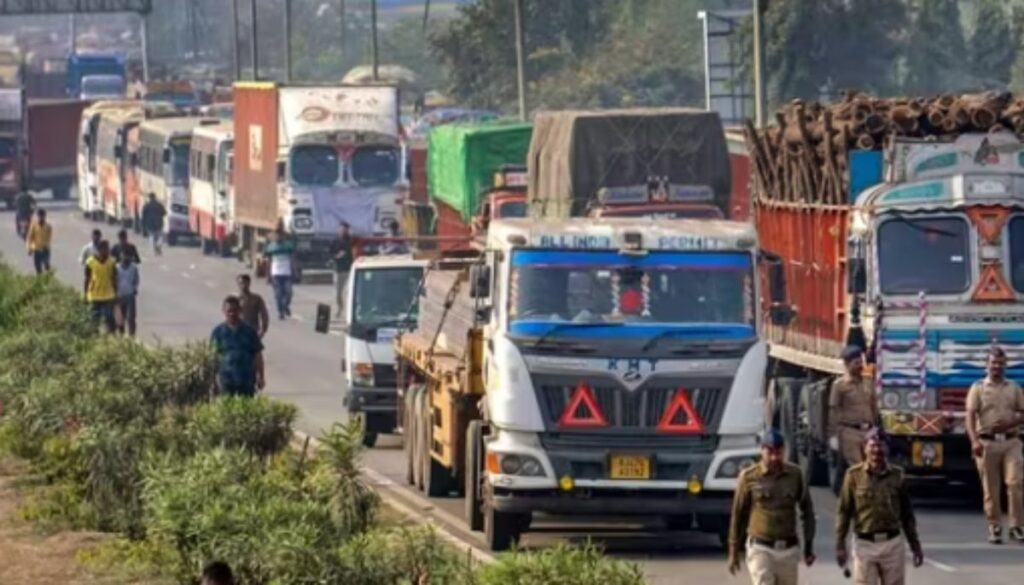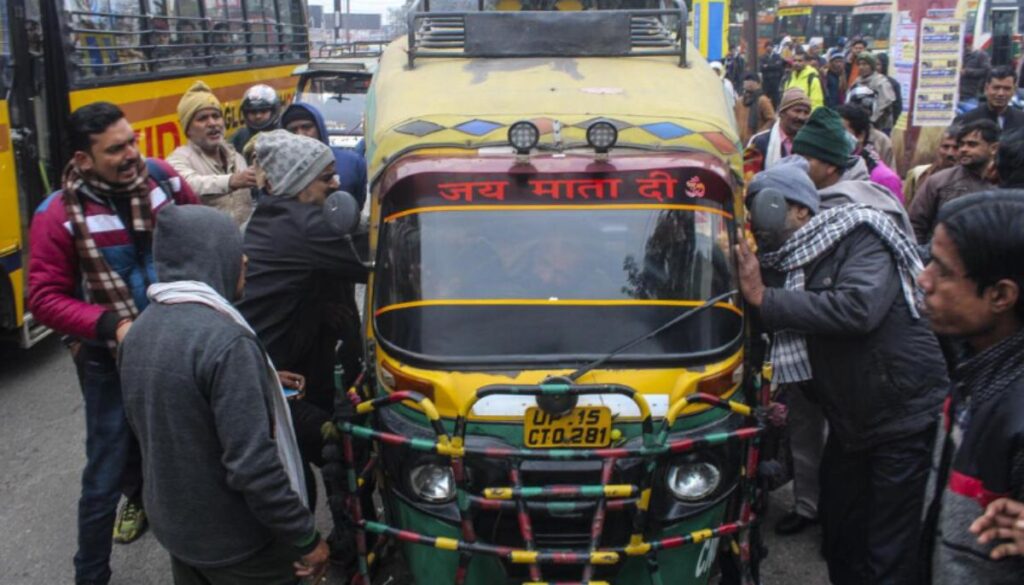Amidst a nationwide strike by transport workers protesting new laws, the Indian government assures them the laws are not yet in effect. This latest development offers potential for resolving the current disruption and ensuring smooth transport operations. Stay informed on the evolving situation with details on the strike, the contested laws, and the ongoing dialogue between authorities and workers.
Nationwide truckers have been demonstrating against a new rule that increases the severity of punishment for hit-and-run accidents.

The Bharatiya Nyay Sanhita’s provisions relating road accidents were acknowledged by the Narendra Modi government on Tuesday. However, the decision to invoke these provisions will only be made after consulting with the All India Motor Transport Congress.
The statement said, “The Government of India held a detailed discussion with the representatives of the All India Motor Transport Congress today and took cognizance of the concerns of truckers regarding the provision of 10 years imprisonment and fine, under Section 106 (2) of the Bharatiya Nyay Sanhita.”
Nationwide truckers have been demonstrating against a new rule that increases the severity of punishment for hit-and-run accidents. This move caused delays in the delivery of products and sparked worries about possible petrol shortages.
“The government wants to point out that these new laws and provisions have not yet come into force,” the government continued. We also want to make it clear that the All India Motor Transport Congress will only be consulted before deciding to apply Section 106(2) of the Bharatiya Nyay Sanhita.
It also requested that all drivers return to their respective workplaces, as well as the All India Motor Transport Congress.
We had a discussion with representatives of the All India Motor Transport Congress. The government wants to say that the new rule has not been implemented yet, but we all want to say that before implementing Bharatiya Nyaya Sanhita 106/2, we will have a discussion with All India Motor Transport Congress representatives and only then will we take a decision, Union Home Secretary Ajay Bhalla stated in a briefing following the meeting.”
“You are not just our drivers; you are our soldiers,” All India Motor Transport Congress President Amrit Lal Madan told reporters. You men work, just like troops do on the nation’s frontiers. We don’t want you to experience any difficulties. The ten years of imprisonment and fine that were imposed have been postponed, according to Union Home Minister Amit Shah. No laws will be implemented until the All India Motor Transport Congress convenes again.
Tuesday marked the start of the second day of the statewide walkout by transport associations and drivers in opposition to the recently implemented Bharatiya Nyay Sanhita (BNS).
Stricter punishments have been established for hit-and-run cases under the BNS, which recently superseded the Indian Penal Code of the colonial era. The BNS specifically targets drivers involved in serious accidents who depart the scene without reporting the occurrence to the police. The new law imposes a heavy fine of ₹7 lakh along with a maximum sentence of 10 years in prison for anybody responsible for such incidents.
The protests reached parts of Maharashtra, Gujarat and Rajasthan.
Also Read: SUKANYA SAMRIDDHI YOJANA INTEREST RATES INCREASED TO 8.2%
lines at gas stations, some of which are dry, during the nationwide truckers’ strike
The new Bharatiya Nyaya Sanhita, which allows drivers to be imprisoned for up to 10 years in hit-and-run incidents, is being opposed by truckers.

Due to the strike by commercial vehicle drivers, including truckers and tankers, who are opposing the new penal law’s hit-and-run clause, many petrol pumps, especially in hill stations and isolated areas, are either completely dry or about to run out of auto fuel.
Major cities like Mumbai, New Delhi, and the National Capital Territory of Delhi currently have open petrol and diesel pumps, but supply in the smaller towns and hinterland are impacted, according to a rapid assessment of retail outlets nationwide.
Truck drivers are demonstrating against the new Bharatiya Nyaya Sanhita, which was designed to replace the Indian Penal Code and stipulates that a motorist may be imprisoned for up to ten years in the event of a hit-and-run. “Drivers view the law as harsh and biassed. If we stay in the event of an accident, a vengeful mob might use us to harm people and property. A driver of an oil tanker requested to remain anonymous and stated, “And if we ran, we would be subject to harsh punishment.”
According to a pump dealer from Maharashtra who asked to remain anonymous, oil tankers intended to transport fuel from refiners’ depots across the country are stuck because their drivers won’t drive because they oppose the new rule or are afraid of retaliation from the demonstrators.
While Mumbai’s fuel and diesel stations still have supplies due to the redemptive action, they won’t last long. According to him, the pumps in Thane and Ulhasnagar are already empty. “Even though I own my own tankers, the drivers won’t operate them,” the Indian Oil Corporation (IOC) dealer, who works for the government, stated.
Numerous pumps in the vicinity are dry as a result of tankers not operating, according to another pump owner on the Delhi-Meerut highway. Tankers come in two varieties. The bulk of dealers rely on carriers hired by businesses and governed by the Industry Transport Discipline Guidelines (ITDG), however large dealers operate their own tankers. He stated that the ITDG’s maximum penalty is a one-week suspension, which is still preferable to running the risk of driving while intoxicated.
A dealer from Delhi, who operates three pumps in the National Capital Region (NCR), said he prepared for the circumstance by stockpiling adequate fuel and expected oil marketing organisations to find a means to maintain supplies. Emails to Indian Oil Corporation (IOC), Bharat Petroleum Corporation Ltd (BPCL), and Hindustan Petroleum Corporation Ltd (HPCL), three state-run oil refiners, have not yet been answered. In India, the three public sector companies hold nearly 90% of the retail petroleum industry. A answer to a query submitted to the petroleum ministry is also awaited.
Dealers in Chandigarh warned that since protesters are preventing oil tankers from operating, the situation in Punjab and Haryana may worsen. “After panic buying, the situation is getting worse,” one of them—who wished to remain anonymous—said.
Approximately 1,500 oil tankers, which transport petroleum to Jammu and Kashmir (J&K) in addition to Ladakh, went on strike, according to a Tuesday morning report from HT. A fuel shortage resulted from the truckers’ worldwide protest against the Center’s new laws relating hit-and-run cases in Himachal Pradesh, where numerous petrol stations in major towns were observed restricting fuel.










